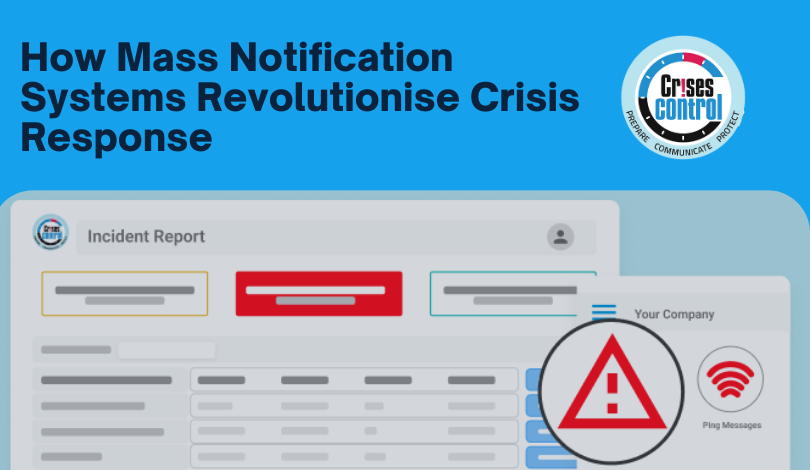In times of crisis, chaos can reign supreme. Whether it’s a natural disaster, a security breach, or any unforeseen event that threatens the safety and well-being of individuals, the need for swift and effective communication becomes paramount. That’s where mass notification systems come into play, acting as the guiding light in the darkness of uncertainty.
In this blog, we delve into the transformative power of mass notification systems and how they revolutionise crisis response, turning chaos into calm. By exploring their features, benefits, and real-world applications, we aim to shed light on the invaluable role these systems play in safeguarding lives, streamlining emergency communication, and building resilience in the face of adversity. Join us as we uncover the untapped potential of mass notification systems and discover how they are reshaping crisis management strategies worldwide.
The Importance of Crisis Management
In today’s fast-paced business world, crises can strike unexpectedly, jeopardising an organisation’s operations, reputation, and bottom line. Effective crisis management is essential to mitigate the impact of these events. It involves a strategic approach to identify potential risks, develop response plans, and execute coordinated actions to minimise disruptions. Crisis management encompasses various aspects, including communication, decision-making, and ensuring business continuity. By adopting robust crisis management practices, organisations can proactively prepare for unforeseen events and respond with agility and confidence when they occur.
Understanding Mass Notification Systems
These systems are a vital component of crisis management. These systems enable organisations to communicate critical information swiftly and efficiently to a large audience during emergencies. Whether it’s a natural disaster, security breach, or operational disruption, systems provide a reliable means of reaching employees, stakeholders, and the public. By leveraging various communication channels, such as mobile apps, SMS, email, and voice calls, mass notification systems ensure that important alerts, updates, and instructions are promptly delivered to the intended recipients.
How Mass Notification Systems Enhance Crisis Response
These systems revolutionise crisis response by enabling organisations to take swift and coordinated actions in times of chaos. Here’s how these systems enhance crisis management:
Rapid and Reliable Communication
During a crisis, time is of the essence. These systems facilitate quick dissemination of critical information to relevant parties, ensuring that everyone receives important updates simultaneously. By delivering real-time alerts, instructions, and safety measures, these systems enable organisations to respond promptly and effectively.
Wide Reach and Accessibility
In crisis situations, reaching a wide audience quickly is crucial. Mass notification systems leverage multiple communication channels, ensuring that messages reach individuals through their preferred channels. Whether it’s through mobile devices, email, or voice calls, organisations can reach employees and stakeholders, irrespective of their location.
Targeted Messaging
Not all crises affect every individual in an organisation equally. These systems allow organisations to segment their audience and send targeted messages based on location, department, or role. This ensures that individuals receive information relevant to their specific circumstances, minimising confusion and improving response effectiveness.
Two-Way Communication
Effective crisis response requires not only delivering information but also gathering feedback and maintaining an open line of communication. These systems enable two-way communication, allowing recipients to acknowledge messages, provide updates, and seek clarification. This fosters collaboration and ensures that organisations have a clear understanding of the situation on the ground.
The Role of Business Continuity in Crisis Management
While crisis response focuses on addressing immediate challenges, business continuity planning is crucial for long-term resilience. Business continuity encompasses strategies and measures to ensure essential operations continue during and after a crisis. It involves identifying critical processes, implementing backup systems, and establishing alternative workflows. By integrating business continuity planning into their crisis management strategies, organisations can minimise disruptions, protect their reputation, and accelerate recovery.
Crises Control: Your Partner in Crisis Response
When it comes to effective crisis response, Crises Control is the trusted partner for organisations worldwide. With its comprehensive crisis management platform, Crises Control empowers organisations to navigate crises confidently and efficiently. Here’s how Crises Control revolutionises crisis response:
Advanced Mass Notification Capabilities
Crises Control offers a state-of-the-art system that enables organisations to reach employees and stakeholders with critical information instantly. With a range of communication channels, including mobile apps, SMS, and email, organisations can ensure that their messages are delivered promptly, even during high-stress situations.
Real-Time Incident Tracking
Crises Control provides real-time incident tracking, allowing organisations to monitor the crisis response progress, assess the impact, and make informed decisions. The platform offers visibility into ongoing incidents, response activities, and key metrics, empowering organisations to adapt their strategies as needed.
Task Management and Collaboration
Collaboration is essential during crisis response. Crises Control facilitates task management, enabling teams to assign and track tasks, ensuring accountability and seamless coordination. With centralised information sharing and real-time updates, organisations can collaborate effectively, improving their response efficiency.
Integration and Customization
Crises Control offers integration capabilities with existing systems, such as HR databases and security systems, streamlining information flow and enabling automated response actions. The platform can be tailored to fit specific organisational requirements, ensuring a seamless integration into existing crisis management workflows.
Conclusion
Mass notification systems play a pivotal role in revolutionising crisis response. With their ability to facilitate rapid and reliable communication, wide reach, targeted messaging, and two-way communication, these systems enhance crisis management efforts. When coupled with robust business continuity planning, organisations can navigate crises successfully and protect their operations and reputation. Crises Control, with its advanced mass notification capabilities, real-time incident tracking, task management features, and integration options, is the ideal partner for organisations seeking to transform chaos into calm during critical situations.
To experience the power of Crises Control firsthand and discover how it can revolutionise your organisation’s crisis response, request a live demo or get in touch with our experts today. Take the first step towards effective crisis management by visiting this link.
